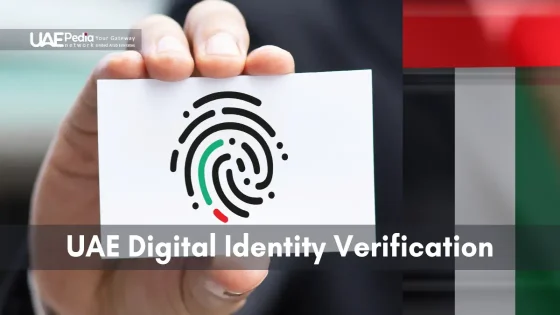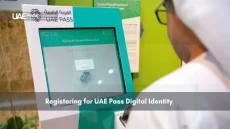The UAE is changing how people use government services with digital identity verification. How safe is your digital identity in the United Arab Emirates? What keeps your personal info safe in this fast-changing digital world?
Data is encrypted with quantum-resistant algorithms under the UAE Cybersecurity Council’s 2025 standards. The UAE has made big steps in digital identity verification. The UAE Pass app lets users make a verified account in under 5 minutes. This uses biometric face recognition, a big improvement from the 20 minutes it used to take.
As of 2025, over 8 million UAE residents use UAE Pass, with 95% of federal services integrated (Digital Dubai Authority, 2025). Digital identities change how the UAE interacts with government and private services.
The United Arab Emirates protects digital identities through an integrated framework built on Emirates ID, UAE Pass, and a blockchain-enabled KYC portal. Data are encrypted with quantum-resistant algorithms that meet the Cybersecurity Council’s 2025 standards. Emirates ID embeds biometric and demographic information on a smart card, while UAE Pass extends those credentials to mobile devices with facial recognition, liveness detection, and NFC card scanning—cutting account-creation time to under five minutes and covering 95 percent of federal e-services for more than eight million residents.
The system lowers fraud risk and onboarding costs for the 120-plus financial institutions connected to the national KYC portal, and a pilot link with Saudi Arabia’s Absher platform enables seamless cross-border verification. End-to-end encryption, consent requirements defined by the 2025 Data Law, and AI-driven anomaly detection planned for the 2025-2030 roadmap further harden privacy and resilience, supporting secure integration across government, banking, and telecom APIs while improving operational efficiency.
Key Takeaways:
- Quantum-resistant encryption meets 2025 standards.
- UAE Pass creates accounts in five minutes.
- Over eight million active UAE Pass users.
- Ninety-five percent federal services integrated.
- Liveness detection thwarts biometric spoofing attacks.
- Blockchain KYC portal streamlines financial onboarding.
UAE Digital Identity Verification Systems
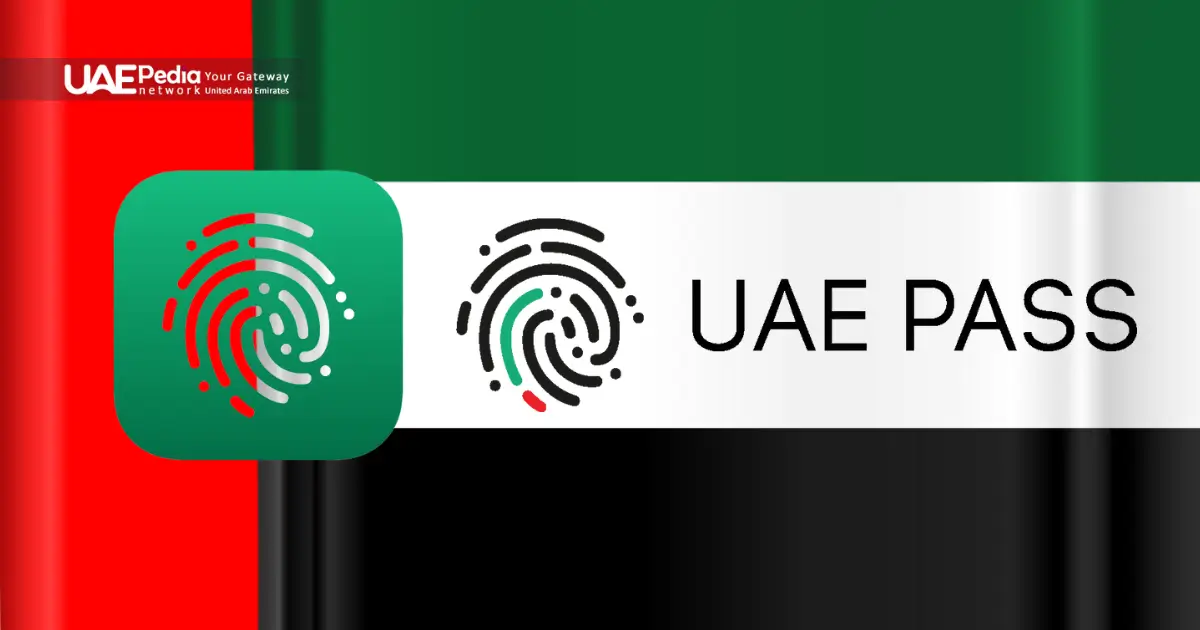
The UAE is a leader in digital identity verification. It has advanced systems for secure access to government services. These systems also protect user data.
How Emirates ID Supports Digital Identity Verification
The Emirates ID is key in the UAE’s digital identity. It’s important for both citizens and residents. This smart card holds personal info and biometric data. It’s used for identity checks in many services.
Read More:
UAE Pass Features and Biometric Login Process
In 2025, UAE Pass added NFC-based Emirates ID scanning for offline verification, reducing dependency on biometrics in low-network areas.
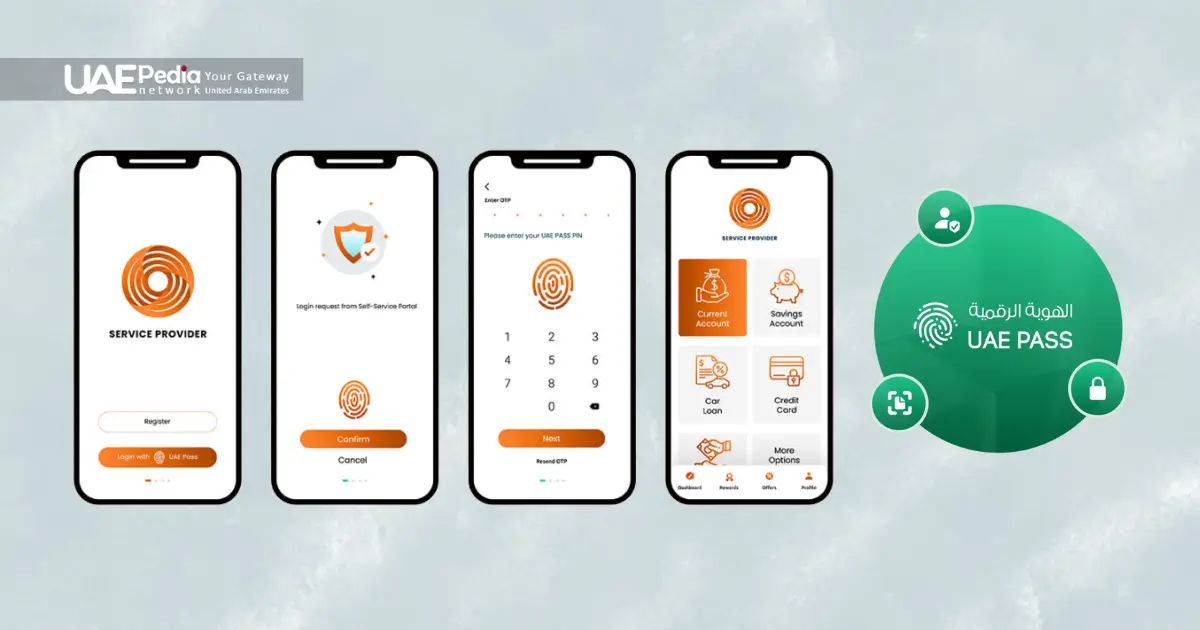
UAE Pass is the UAE’s national digital identity platform. It lets you sign in once for many services. The app uses face recognition for safe logins.
NFC-based Emirates ID scanning may not function optimally on older devices lacking required hardware features, impacting user experience in low-resource settings Ref.: “Ministry of Health and Prevention (2025). Safeguarding UAE Pass: A guide to a secure digital identity. UAE Government”
Biometric Security Measures in UAE Identity Verification
Facial recognition now uses liveness detection in 2025 update, to prevent deepfake spoofing, as mandated by TDRA’s Anti-Spoofing Framework.
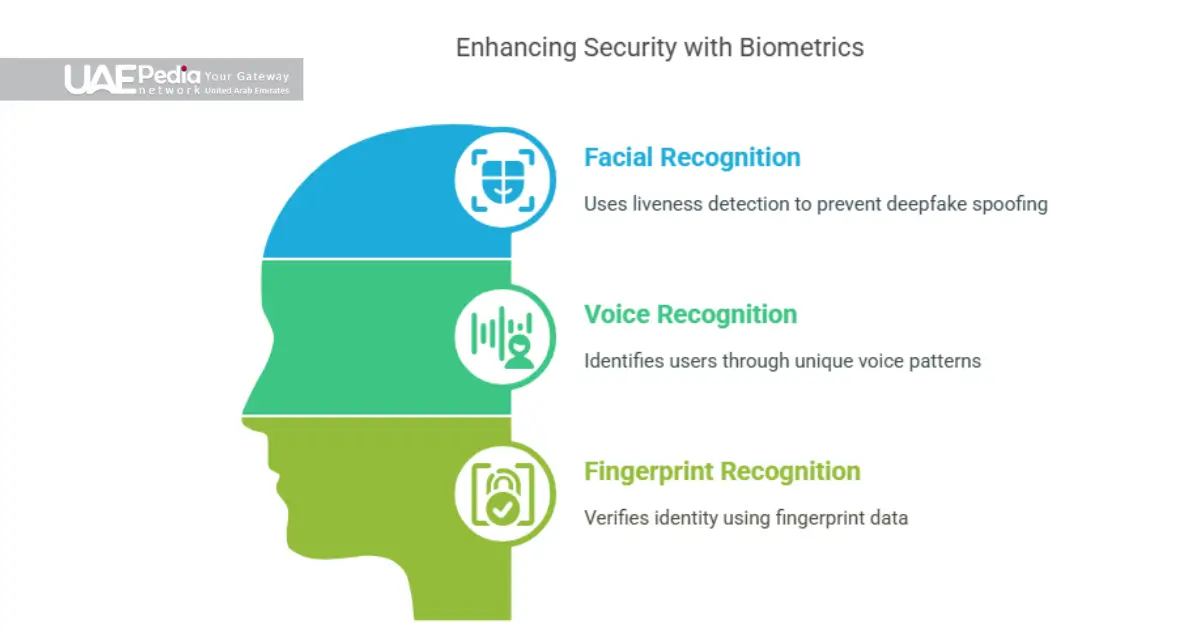
Biometric methods in the UAE make things more secure and accurate. They include facial, voice, and fingerprint recognition. These methods protect user data and credentials well.
| Feature | Emirates ID | UAE Pass |
|---|---|---|
| 2025 User Base | 15 M | 8 M |
| Issued By | Federal Identity & Citizenship Authority | Digital Dubai, TDRA, Dept. of Government Enablement |
| Primary Use | Physical & Digital Identification | Digital Services Access |
| Biometric Data | Stored on Card | Used for Online Verification |
| Integration | Government Services | Government & Private Sector Services |
The UAE’s digital identity systems are getting better fast. Over 5 million IDs are registered for UAE Pass. These systems make it easier to access services while keeping things safe.
Adoption of liveness detection as mandated by the Anti-Spoofing Framework follows leading industry approaches to mitigate deepfake attacks Ref.: “Facia.ai (2023). Liveness Detection in Face Recognition: Evolution of Biometrics. Facia.ai”
Benefits and Implementation of Digital Verification
The UAE’s digital identity systems bring many good things. They make things safer, easier, and faster for everyone.
How UAE Digital ID Prevents Fraud and Cyber Threats
Digital ID in the UAE keeps your identity safe from fraud. It uses cool tech like biometrics and checks documents. This means only the right people can get to your info.
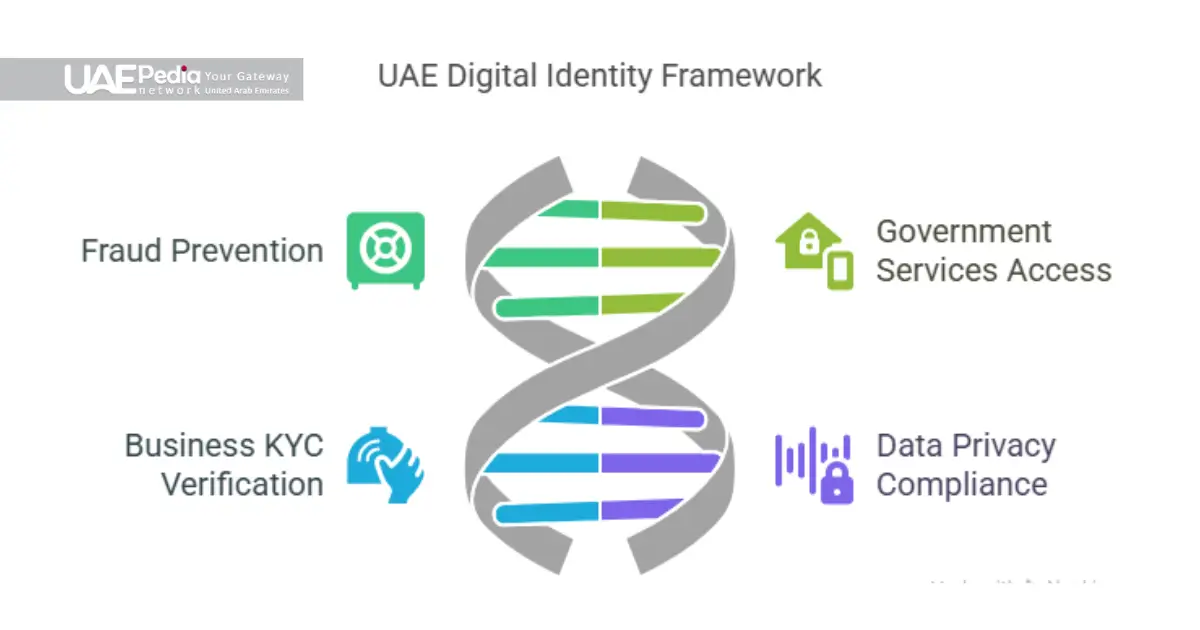
Accessing Government Services Faster with UAE Pass
The UAE Pass changes how we deal with government. You can use your phone to get many services. It makes things easier and faster.
How Private Businesses Use UAE Pass for KYC Verification
Digital ID is key for businesses in the UAE. It works well with services like banks and phone companies. This makes checking your identity easy and safe everywhere.
Data Privacy Compliance and Cross Border Verification
The UAE Data Law (2025) aligns with global privacy standards, requiring explicit consent for biometric data use. By mirroring principles in the EU GDPR and DIFC Data Protection Law, it grants residents stronger rights over how facial recognition, fingerprints, and other sensitive identifiers are stored, shared, and retained.
Alignment of UAE Data Law with GDPR principles ensures robust data subject rights and mirrors international privacy frameworks Ref.: “Chambers and Partners (2025). Data Protection and Privacy 2025: UAE. Chambers and Partners”
UAE Pass is interoperable with Saudi Arabia’s Absher platform for GCC travel (2025 pilot). The linkage lets residents reuse a single verified identity to access e‑services, pre‑clear customs, and manage travel documents in both jurisdictions, paving the way for seamless cross‑border verification across the Gulf.
Reducing Costs with Digital Identity Verification in the UAE
Going digital saves money for everyone. It cuts down on costs and makes things faster. This makes people happier with the service. As of 2025, 80% of major banks support UAE Pass APIs, per Central Bank directives (2024).
| Benefit | Impact |
|---|---|
| Enhanced Security | Reduced fraud and identity theft |
| Operational Efficiency | Faster processing times and lower operational costs, boosting overall efficiency |
| Private Sector Integration | Seamless verification across multiple services |
The UAE is always making digital identity better. It will keep adding new features and services. This will make our digital world even better and more connected.
Read more: Booking Government Appointments Online UAE
The UAE’s digital identity systems have changed how people and businesses use e-government. The Emirates ID and UAE Pass make things safer and easier. They answer many questions about digital identity in the UAE.
The “Know Your Customer” (KYC) digital portal shows the UAE’s digital leadership. It was made by Federal Decree-Law No. 30 of 2024. This system keeps financial data safe and private. The KYC portal (launched Q1 2025) allows instant verification for 120+ financial institutions via blockchain-secured data sharing.
Check out the below:
The UAE PASS app shows the country’s digital growth. It lets people use online government services easily. It uses face ID, stores digital documents, and supports many languages. This makes life easier for everyone.
The UAE is always looking to improve. They might make biometric checks better and protect against cyber threats. This will make the UAE a true digital leader. The 2025–2030 Digital Identity Roadmap includes iris recognition for high-risk transactions and AI-driven anomaly detection (Digital Dubai, 2025).
